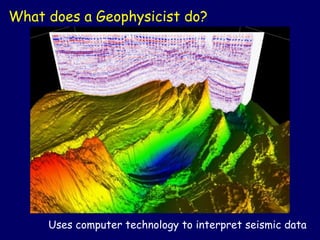All Categories
Featured
Table of Contents
Geophysical Survey Flashcards in Ferndale WA 2021
This work is increasingly contracted out, so consultancies offer another source of work. Consultancy companies differ in size, from extremely little companies to large multinationals. Some consultancies are quite specialised in using particular geophysical strategies or operating in specific places, while others provide a more varied variety of services to their consumers.
The extraction of gas from land fill websites is another area of employment and this might grow in the future. Exploration business might undertake work for building and construction firms, water companies, mining business and ecological agencies, so geophysicists may be used in any of these settings. Other companies consist of: geological surveysgovernment bodies and agenciesuniversities and research institutes.


Vacancies might be noted in the oil and gas sector press. Recruitment is affected by oil price variations and the level of competitors for positions differs depending upon this. Professions Days, which cover the complete series of geoscience professions and are usually attended by a variety of key industry employers, are run by The Geological Society.
Geophysical Surveys: Definition & Methods in Caversham Oz 2021
A few of the large oil and gas business provide a complete two-year structured training programme across the breadth of geophysics, consisting of the opportunity to experience work in different teams prior to specialising in one location. Your training might consist of deal with: existing wellsmagnetic and gravitational prospective field information analysisresearchrock analysis. Nevertheless, it's more normal for your preliminary training to be supplied on the task.

There might be a probationary period during which you work alongside a knowledgeable colleague. Competency-based appraisals happen frequently in many companies. In smaller companies, and for scholastic posts, there is not likely to be any formal training - you'll be anticipated to begin work straightaway and select up abilities as you go along.
If you work for a smaller company, you might discover that you need to take obligation for arranging and moneying your own development and training. If you have a geology degree, membership of The Geological Society can be useful for networking and for maintaining to date with the industry.
What Should I Do To Be A Geophysicist? in Hovea WA 2022
You might also discover it beneficial to join the PESGB (The Petroleum Exploration Society of Great Britain, which has a geophysics special interest group. After a probationary period, and once you've gained some experience, you might progress to senior geophysicist, then team leader and then into a senior role in management.
The ease of motion between roles depends upon the company structure. Research study at Masters or Ph, D level in a subject associated to geophysics or geosciences might help with your career development and progression. The employment market within the oil and gas market is really based on price and this may affect your chances for profession development.
For skilled geophysicists, freelance consultancy provides a great path for profession advancement. As a geophysicist, you're likely to have a number of jobs throughout your working life.
What Is Geophysics? in Alfred Cove Aus 2020
From geophysics, it's possible to concentrate on seismology (completing more training to become a seismic interpreter) or to move into related areas such as engineering geology or risk forecast.
Choosing what to study in college is a difficult option. Even if you know that your field of interest lies in science, what program of study is ideal for you?
The very first step to achieving your goal of ending up being a geophysicist is earning a degree. Even for entry-level positions in the field of geoscience, you'll need a bachelor's degree (a geophysicist college degree) from a recognized college or university. Some research positions need prospects to hold master's degrees or perhaps Ph.
What Does A Geophysicist Do? in Leederville Oz 2022
Doctoral degrees are particularly essential if you prepare to teach at a four-year organization. Geophysicists apply physics concepts and techniques to study the gravitational, magnetic, and electrical fields of the earth. This enhances researchers' understanding of both the world's interior core and its surface. Geophysicists should be able to: examine rocks, pictures, and other pieces of data carry out research study both in the field and in laboratories create maps and charts of their findings write reports To accomplish all this, students need a specialized education for geophysicist professions.
As mentioned above, you'll need a bachelor's degree in geoscience or a related discipline, such as a physical science or a life sciences, to land an entry-level job. Students can also prepare by majoring in subjects like: Biology Chemistry Computer science Engineering Mathematics Physics The above geophysicist majors offer a more generalized approach to a single scientific discipline, however a lot of programs require trainees to take one or more geology course.
Table of Contents
Latest Posts
Geophysical Survey - Mining Fundamentals in Mahogany Creek Aus 2023
How To Become A Geophysicist in South Fremantle Oz 2022
Field Geophysicist - Parsons Careers – Engineered Systems in Ballajura Aus 2021
More
Latest Posts
Geophysical Survey - Mining Fundamentals in Mahogany Creek Aus 2023
How To Become A Geophysicist in South Fremantle Oz 2022
Field Geophysicist - Parsons Careers – Engineered Systems in Ballajura Aus 2021